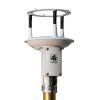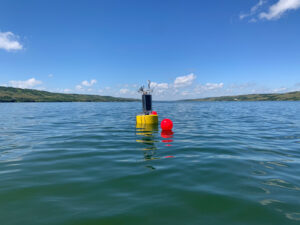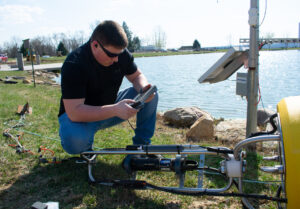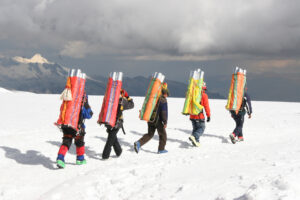YOUNG ResponseONE Weather Transmitter
Features
- Measures ultrasonic wind speed and direction, atmospheric pressure, humidity and temperature
- Serial output formats include SDI-12, NMEA, and ASCII text
- Wiring connections are made in a convenient weather-proof junction box
- Free ground shipping
- Expedited repair and warranty service
- Lifetime technical support
- More
Overview
The YOUNG Model 92000 ResponseONE Weather Transmitter measures four key meteorological variables with one compact instrument. It is ideal for many weather monitoring applications requiring accurate and reliable measurements. Ultrasonic wind speed and direction, atmospheric pressure, humidity and temperature sensors are carefully integrated into an enclosure optimized for durability, airflow and mitigation of solar radiation effects. Terminals are provided for connection of an optional tipping bucket rain gauge (sold separately).
Calibrated and Tested
Each sensor is fully wind tunnel tested and calibrated to provide accurate wind measurement over a wide operating range. Standard serial output formats include SDI-12, NMEA, and ASCII text. Output may be continuous or polled to conserve power. Standard RS-232 or RS-485 serial formats enable direct integration with YOUNG displays, marine NMEA systems, data loggers or other compatible serial devices. The sensor mounts on a standard 1-inch IPS pipe. A mounting orientation ring is included that engages with the base of the sensor to retain orientation when the sensor is removed for maintenance. Terminations are made in a junction box at the base of the sensor by small clamp-style connectors (no special connectors are required). The YOUNG Model 92500 ResponseONE Weather Transmitter includes an internal compass to provide orientation for wind direction, making it ideal for mobile or portable applications.
Variables
- Ultrasonic wind speed and direction
- Atmospheric pressure
- Humidity
- Temperature
Wind Speed:
Range: 0–70 m/s (156mph)
Resolution: 0.01 m/s
Accuracy:
±2% or 0.3 m/s (0–30m/s)
±3% (30 – 70 m/s)
Wind Direction:
Azimuth Range: 0-360 degrees
Resolution: 0.1 degree
Accuracy: ±2 degrees
Temperature:
Range: -40 to +60°C
Resolution: 0.1°C
Accuracy: ±0.5°C
Relative Humidity:
Range: 0–100%
Resolution: 1%
Accuracy: ±2%
Atmospheric Pressure:
Range: 500–1100 hPa
Resolution: 0.1 hPa
Accuracy: ±0.5 hPa
Electronic Compass (Model 92500):
Range: 0–360 degrees
Resolution: 0.1 degree
Accuracy: ±2.0 degrees
Serial Output (selectable):
Interface: RS-232, RS-485/422, SDI-12
Formats: NMEA, SDI-12, ASCII (polled or continuous)
Baud Rates: 1200, 4800, 9600, 19200 and 38400
Power
Voltage: 10–30 VDC
Current: 7 mA @ 12 VDC typical, 80 mA max
General
Protection Class: IP65
EMC Compliance: FCC Class A digital device, IEC Standard 61326-1
Dimensions: 30 cm high x 13.5 cm wide
Weight: 0.7 kg (1.5lb)
Shipping Weight: 1.6 kg (3.5lb)
Operating Temperature: -40 to +60°C
Removable Bird Spikes: Included
In The News
Combating Water Insecurity in Saskatchewan with Real-Time Data
The prairies of Saskatchewan can be described as one of the least water-secure parts of Canada, making water quality monitoring essential for informed resource management in a region already facing water insecurity. While natural physical properties worsen some of the poor water quality conditions in the region, others are connected to land use. Having grown up spending summers on the shores of Lake Huron, Helen Baulch, an associate professor at the School of Environment and Sustainability at the University of Saskatchewan , has always been dedicated to the protection of water resources. Looking back fondly at her childhood playing along the shore, Baulch also recalls the invasion of quagga mussels during her teenage years and watching the lake change as a result.
Read MoreSeametrics Turbo Turbidity Logger: Boost your Turbidity Monitoring
The Seametrics Turbo Turbidity Logger is a self-cleaning turbidity sensor capable of internally logging over 260,000 data records. The sensor enables researchers, compliance officers, and contractors to monitor turbidity in various applications, from construction and dredging sites to wastewater effluent. Due to its narrow width, this device can be deployed in a range of areas, from small well spaces to rivers and streams. The stainless steel housing and built-in wiper allow the sensor to withstand long-term deployments and reduce the need for maintenance trips. The logger accurately records temperature and turbidity up to a depth of 50 meters.
Read MoreCollecting Data at the Top of the World: How Scientists Retrieve Glacial Ice Cores
A helicopter touches down in the small town of Sicuani, Peru, at an elevation of 11,644 feet. Earlier that day, a boxcar brought fuel, drills, food, and other equipment for a glacial expedition. The year is 1979, and glaciologist Lonnie Thompson is preparing to lead a team to the Quelccaya ice cap in hopes of becoming the first scientists to drill an ice core sample from this glacier. The only problem? The glacier is located at 19,000 feet in one of the most remote areas of the world. The helicopter takes off from the town, but the thin atmosphere at that elevation does not allow it to safely touch down on the ice– due to the aircraft’s weight, and it becomes unstable when the air is less dense.
Read More














